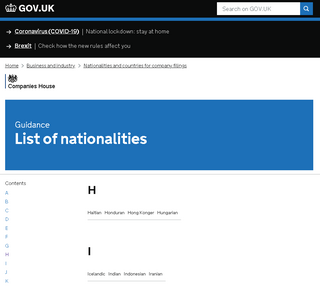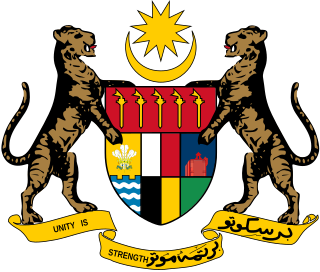
The term "British subject" has several different meanings depending on the time period. Before 1949, it referred to almost all subjects of the British Empire. Between 1949 and 1983, the term was synonymous with Commonwealth citizen. Currently, it refers to people possessing a class of British nationality largely granted under limited circumstances to those connected with Ireland or British India born before 1949. Individuals with this nationality are British nationals and Commonwealth citizens, but not British citizens.

Canadian nationality law details the conditions by which a person is a national of Canada. The primary law governing these regulations is the Citizenship Act, which came into force on February 15, 1977 and is applicable to all provinces and territories of Canada.

The British Nationality Act 1981 (c.61) is an Act of the Parliament of the United Kingdom concerning British nationality since 1 January 1983.

The Ireland Act 1949 is an Act of the Parliament of the United Kingdom intended to deal with the consequences of the Republic of Ireland Act 1948 as passed by the Irish parliament, the Oireachtas.

A British Overseas citizen (BOC) is a holder of a residual class of British nationality, largely held by people connected with former British colonies who do not have close ties to the United Kingdom or its remaining overseas territories. Individuals with this form of nationality are British nationals and Commonwealth citizens, but not British citizens. BOCs are subject to immigration control when entering the United Kingdom and do not have the automatic right of abode there or in any British overseas territory.

Australian nationality law details the conditions by which a person is a national of Australia. The primary law governing nationality regulations is the Australian Citizenship Act 2007, which came into force on 1 July 2007 and is applicable in all states and territories of Australia.

The Immigration Act 1971 is an Act of the Parliament of the United Kingdom concerning immigration and nearly entirely remaking the field of British immigration law. The Act, as with the Commonwealth Immigrants Act 1962, and that of 1968, restricts immigration, especially primary immigration into the UK. It introduced the concept of patriality or right of abode. It was also partly passed to legally clarify the rights of Commonwealth citizens within the United Kingdom in preparation for membership of the European Communities (EC) in which the United Kingdom would become a member state from 1 January 1973. It was coincidentally the same day which the Act came into full legal force which gave not only new automatic rights to EC member state citizens but would also give them priority over non-EC citizens under the obligations of the Treaty of Rome, of which the UK become a signatory though the Treaty of Accession, signed on 22 January 1972. In relation to deportation notices, the Act is referenced at sections 11 and 23 of the Terrorism Act 2000.

British nationality law as it pertains to Hong Kong has been unusual ever since Hong Kong became a British colony in 1842. From its beginning as a sparsely populated trading port to today's cosmopolitan international financial centre and world city of over seven million people, the territory has attracted refugees, immigrants and expatriates alike searching for a new life.

This article concerns the history of British nationality law.

Irish citizens in the United Kingdom enjoy a special status when residing there, due to close proximity of the UK and Ireland and historical ties between the two countries. They are considered to have automatic and permanent permission to live in the UK and are eligible to vote, stand for public office, and serve in non-reserved government positions.

Malaysian nationality law details the conditions by which a person is a national of Malaysia. The primary law governing nationality requirements is the Constitution of Malaysia, which came into force on 27 August 1957.
A Commonwealth citizen is a citizen or qualified national of a Commonwealth of Nations member state. Most member countries do not treat citizens of other Commonwealth states any differently from foreign nationals, but some grant limited citizenship rights to resident Commonwealth citizens. In 16 member states, resident non-local Commonwealth citizens are eligible to vote in elections. The status is most significant in the United Kingdom, and carries few or no privileges in many other Commonwealth countries.

A British Overseas Territories citizen (BOTC), formerly called British Dependent Territories citizen (BDTC), is a member of a class of British nationality granted to people connected with one or more of the British Overseas Territories.

A British protected person (BPP) is a member of a class of British nationality associated with former protectorates, protected states, and territorial mandates and trusts under British control. Individuals with this nationality are British nationals, but are neither British nor Commonwealth citizens. Nationals of this class are subject to immigration controls when entering the United Kingdom and do not have the automatic right of abode there or any other country.

Maltese nationality law details the conditions by which a person is a national of Malta. The primary law governing nationality regulations is the Maltese Citizenship Act, which came into force on 21 September 1964. Malta is a member state of the European Union (EU) and all Maltese nationals are EU citizens. They have automatic and permanent permission to live and work in any EU or European Free Trade Association (EFTA) country and may vote in elections to the European Parliament.

The right of abode (ROA) is an immigration status in the United Kingdom that gives a person the unrestricted right to enter and live in the UK. It was introduced by the Immigration Act 1971 which went into effect on 1 January 1973. This status is held by British citizens, certain British subjects, as well as certain Commonwealth citizens with specific connections to the UK before 1983. Since 1983, it is not possible for a person to acquire this status without being a British citizen.

Cypriot nationality law details the conditions by which a person is a national of Cyprus. The primary law governing nationality regulations is the Republic of Cyprus Citizenship Law, 1967, which came into force on 28 July 1967. Regulations apply to the entire island of Cyprus, which includes the Republic of Cyprus itself and Northern Cyprus, a breakaway region that is diplomatically recognised only by Turkey as the Turkish Republic of Northern Cyprus (TRNC).

The primary law governing nationality in the United Kingdom is the British Nationality Act 1981, which came into force on 1 January 1983. Regulations apply to the British Islands, which include the UK itself and the Crown dependencies, and the 14 British Overseas Territories.

The Nationality, Immigration and Asylum Act 2002 is an Act of the Parliament of the United Kingdom. It received royal assent on 7 November 2002.

Fijian nationality law details the conditions by which a person is a national of Fiji. The primary law governing nationality requirements is the Citizenship of Fiji Act 2009, which came into force on 10 April 2009.












